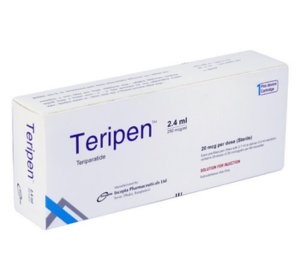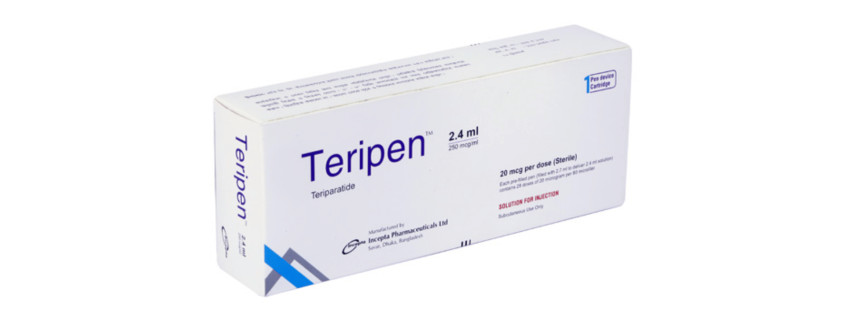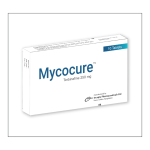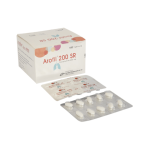Teripen(Teriparatide)

Therapeutic Group: Synthetic human parathyroid hormone analog
Presentation
TeripenTM: Each mL injectable solution contains teriparatide INN 250 mcg. Each cartridge is filled with 2.7 ml to deliver a 2.4 ml solution. Each cartridge, pre-assembled into a delivery device (Pen), delivers 20 mcg of teriparatide per dose each day for up to 28 days.
Description
Teripen (teriparatide injection) is a synthetic human parathyroid hormone analog (PTH 1-34). Teripen is supplied as a sterile, colorless, clear, isotonic solution in a glass cartridge that is pre-assembled into a disposable delivery device (pen) for subcutaneous injection.
Indications
• Treatment of Postmenopausal Women with Osteoporosis at High Risk for Fracture
• Increase of Bone Mass in Men with Primary or Hypogonadal Osteoporosis at High Risk for Fracture
• Treatment of Men and Women with Glucocorticoid-Induced Osteoporosis at High Risk for Fracture
Dosage & Administration
For all indications, the recommended dose is 20 mcg subcutaneously once a day.
Side Effects
Teripen is generally well tolerated and safe, as found in different clinical trials. The most common side-effects are: pain, Asthenia, Headache, Hypertension, Nausea, Constipation, Diarrhea, Arthralgia, Dizziness, Rhinitis, Increased cough, Pharyngitis, rash, etc. Moreover, teriparatide causes a transient increase in serum calcium, urinary calcium, and uric acid.
Precautions
• Osteosarcoma: Teriparatide should not be prescribed for patients at increased baseline risk of osteosarcoma
• Bone Metastases and Skeletal Malignancies: Patients with bone metastases or a history of skeletal malignancies should not be treated with Teripen.
• Metabolic Bone Diseases: Patients with metabolic bone diseases other than osteoporosis should not be treated with Teripen
• Hypercalcemia and Hypercalcemic Disorders: Patients known to have an underlying hypercalcemic disorder, such as primary hyperparathyroidism, should not be treated with Teripen
• Urolithiasis or Pre-existing Hypercalciuria: Teripen should be used with caution in patients with active or recent urolithiasis because of the potential to exacerbate this condition.
• Orthostatic Hypotension: Teripen should be administered initially under circumstances in which the patient can sit or lie down if symptoms of orthostatic hypotension occur.
Use in Pregnancy & Lactation
Pregnancy: There is no available data on Teripen use in pregnant women. Consider discontinuing Teripen when pregnancy is recognized
Lactation: It is not known whether teriparatide is excreted in human milk, affects human milk production, or has effects on the breastfed infant. Pediatric use: The safety and efficacy of Teripen have not been established in any pediatric population.
Drug Interaction
Teripen has drug interactions with digoxin, hydrochlorothiazide, and furosemide. Therefore, caution should be exercised during co-administration.
Over Dose
There is no specific antidote for teriparatides. Treatment of suspected overdose should include discontinuation of Teripen, monitoring of serum calcium and phosphorus, and implementation of appropriate supportive measures, such as hydration
Storage
Store at 2°C to 8°C all the time in a refrigerator. Do not freeze. Keep away from light & out of reach of children.
Commercial Pack
TeripenTM: Each box contains one cartridge, pre-assembled into a delivery device (Pen), a leaflet, & a user manual.



